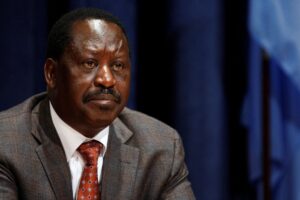Why Raila Urged His Supporters to Switch to Airtel Back Then
Share
At the height of post election tensions in 2017, a major political and economic scandal happened when opposition party leader Raila Odinga asked his followers to boycott Safaricom and instead transfer to Airtel Kenya based on the claim that Safaricom company had a role in irregularities that were being experienced in the general elections.
During the post election, Raila Odinga, who led the National Super Alliance (NASA) complained that Safaricom was not relaying the presidential election results at polling stations to the IEBC servers as it should.
The opposition alleged that this failure compromised the transparency and integrity of the electoral process.
In an interview with the press, Raila claimed that the telecommunications firm was a “part of the wider scheme to subvert the will of the people”.
In an extension of an overall economic resistance campaign, he urged his supporters to cease using products and services from companies he claimed were aiding or facilitating electoral fraud, specifically Safaricom, Brookside Dairy and Bidco oil.
To make his stand visible, Raila himself announced that he was migrating his personal Safaricom line to Airtel.
He said the boycott was supposed to send a strong message that Kenyans could use economic power to demand accountability and fairness in leadership.
Also Read:Ruto Enters ODM Political Debate After Raila Odinga’s Death
Safaricom Response to Raila
Safaricom was quick to deny the claims saying they were false, reckless and unnecessary.
Bob Collymore who was the then CEO of the company made a statement defending the involvement of the company in the 2017 election transmission process.
Despite the claims, Collymore said,”contrary to what is alleged, results from KIEMS from Safaricom zones were transmitted and are the IEBC web portal,” adding that Safaricom had not only satisfied all its contractual duties to the electoral commission but also had done so in a satisfactory manner.
Safaricom also stated that it was willing to accept any investigations or personal prosecutions by any side against its involvement and it claimed to have been an upright and professional player during the election time.
The Safaricom Dealers Association also chipped in warning that the boycott would have disastrous economic effects such as massive job layoffs.
“Boycotting Safaricom means no communication networks,and those who will lose jobs are our brothers and sisters with families to feed and children to educate ,” one representative warned.
Also Read:Meet Dr. Joseph Otieno Wasonga, Who Officiated the Burials of Oginga and Raila Odinga
Popular Response and Aftermath.
The boycott movement was very popular throughout the social media, with NASA supporters switching networks to show their solidarity.
However, the economic effect on Safaricom was not as great, since it still had its leading position in the market.
With President Uhuru Kenyatta, Raila Odinga, ended the boycott publicly in May 2018 and publicly pardoned the targeted companies, including Safaricom, following a political truce between the two.
The telecom giant however opted to remain silent when asked about the truce.
The incident still remains to be one of the most memorable instances of economic resistance as a political weapon in Kenya, demonstrating how consumer behavior could be employed to convey political dissatisfaction.
Although the boycott did not significantly change the market dynamics, it showed how interconnected business, politics, and popularity of Kenya in democratizing the country was.
Follow our WhatsApp Channel and WhatsApp Community for instant news updates

Raila Amolo Odinga
PHOTO/NRB/X
